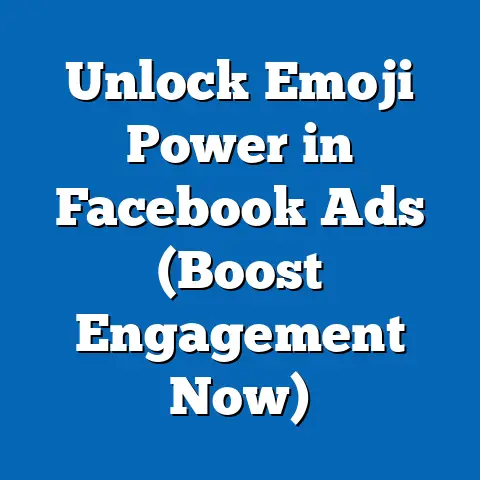Master Facebook Ads Community Standards (Essential Guide)
Facebook advertising can feel like navigating a gilded maze, especially for luxury brands.
We’re not just selling products; we’re selling aspirations, experiences, and a certain lifestyle.
But in this world of curated perfection, it’s easy to stumble upon the platform’s Community Standards.
And trust me, I’ve been there.
I remember one campaign I ran for a high-end watch brand, where we used a lifestyle image that, unbeknownst to us, subtly implied a “get-rich-quick” scheme.
The ad was promptly rejected, and it was a wake-up call to truly understand the nuances of these guidelines.
Luxury brands have the unique opportunity to leverage Facebook’s vast reach, connecting with potential customers who appreciate quality, craftsmanship, and exclusivity.
However, this opportunity comes with a responsibility: to uphold the platform’s Community Standards and ensure our advertising efforts contribute to a positive and respectful user experience.
Facebook’s Community Standards are the bedrock of a safe and trustworthy advertising environment.
They’re designed to protect users from harmful, misleading, or offensive content.
These standards aren’t just a formality; they’re the rules of engagement that dictate what’s acceptable and what’s not on the platform.
Section 1: Understanding Facebook Ads Community Standards
The Facebook Ads Community Standards are more than just a set of rules; they’re the foundation upon which the platform builds its user experience and maintains its integrity.
These standards define the boundaries of acceptable content, ensuring a safe and respectful environment for everyone.
For luxury brands, understanding these standards is crucial, as any misstep can have significant repercussions on their carefully cultivated brand image and reputation.
At their core, these standards are designed to prevent the spread of harmful, misleading, or offensive content.
They cover a wide range of topics, from hate speech and violence to misinformation and deceptive practices.
For advertisers, the standards are categorized into three main areas:
- Prohibited Content: This category includes content that is strictly forbidden on the platform, such as hate speech, violence, terrorism, and the promotion of illegal activities.
- Restricted Content: This category includes content that is allowed on the platform but subject to certain restrictions.
Examples include ads promoting alcohol, gambling, or adult products. - Community Guidelines: These guidelines outline the expected behavior of users on the platform, including advertisers.
They cover topics such as authenticity, respect, and privacy.
Violating these standards can have serious consequences, particularly for luxury brands.
Imagine the backlash if a luxury brand’s ad was flagged for promoting hate speech or misinformation.
The damage to its reputation could be irreparable.
Even seemingly minor violations, such as misleading claims or insensitive content, can erode brand trust and negatively impact ad performance.
I’ve seen firsthand how non-compliance can derail even the most meticulously planned campaigns.
I worked with a luxury travel agency that ran an ad featuring a stunning beachfront villa.
The ad copy promised “unparalleled privacy and exclusivity,” but the image subtly suggested that the villa was completely isolated, which wasn’t entirely true.
While not intentionally misleading, the ad was flagged for exaggerating the villa’s features, resulting in a temporary suspension of their ad account.
According to recent statistics, approximately 2.5 billion pieces of content are removed from Facebook each quarter for violating Community Standards.
While this number includes all types of content, it highlights the importance of understanding and adhering to these guidelines.
For luxury brands, the implications of violating these standards extend beyond ad rejections and account suspensions.
Non-compliance can damage brand trust, erode customer loyalty, and ultimately impact sales.
In today’s digital landscape, where consumers are increasingly discerning and socially conscious, brands must prioritize ethical advertising practices and demonstrate a commitment to upholding community standards.
Key Takeaway: Facebook Ads Community Standards are not just a set of rules; they’re the foundation of a positive and trustworthy advertising environment.
For luxury brands, understanding and adhering to these standards is crucial for maintaining brand integrity, building customer trust, and achieving long-term success on the platform.
Section 2: Luxury Advertising on Facebook
Advertising luxury products and services on Facebook requires a delicate balance of creativity, sophistication, and adherence to Community Standards.
Luxury brands must carefully craft their messaging and visuals to resonate with their target audience while staying within the boundaries of the platform’s guidelines.
It’s a tightrope walk, but one that can yield significant rewards when executed effectively.
One of the most important aspects of luxury advertising is brand storytelling.
Luxury brands aren’t just selling products; they’re selling a lifestyle, an experience, and a sense of belonging.
Their advertising should reflect this by telling compelling stories that connect with their target audience on an emotional level.
I remember working on a campaign for a high-end jewelry brand that decided to shift its focus from product-centric ads to storytelling.
Instead of simply showcasing the jewelry, we created a series of short videos that told the stories of the artisans who crafted each piece.
We highlighted their passion, their skill, and their dedication to quality.
The result was a significant increase in engagement and brand affinity.
However, brand storytelling must be approached with caution.
It’s important to ensure that the stories being told are authentic, transparent, and aligned with Community Standards.
Misleading claims, exaggerated promises, or insensitive content can quickly damage a brand’s reputation.
There are numerous examples of luxury brands that have successfully navigated Facebook’s standards while creating impactful advertising campaigns.
For instance, Chanel has consistently delivered elegant and sophisticated ads that showcase its brand heritage and craftsmanship.
Louis Vuitton has leveraged influencer marketing to connect with younger audiences while maintaining its luxurious image.
And Dior has used stunning visuals and captivating storytelling to promote its fragrances and cosmetics.
These brands have all demonstrated a keen understanding of their target audience and a commitment to creating advertising that is both engaging and compliant.
They’ve also invested in building strong relationships with Facebook’s advertising team, ensuring that their campaigns are reviewed and approved before launch.
Despite these successes, luxury brands still face challenges in creating ads that resonate with their target audience while adhering to guidelines.
One of the biggest challenges is balancing exclusivity with inclusivity.
Luxury brands need to appeal to their core customer base without alienating potential customers who aspire to own their products.
Another challenge is avoiding stereotypes and insensitive content.
Luxury advertising has historically been criticized for perpetuating unrealistic beauty standards and promoting materialistic values.
Brands must be mindful of these criticisms and strive to create advertising that is diverse, inclusive, and socially responsible.
Key Takeaway: Luxury advertising on Facebook requires a delicate balance of creativity, sophistication, and adherence to Community Standards.
By focusing on brand storytelling, avoiding stereotypes, and prioritizing ethical advertising practices, luxury brands can create campaigns that resonate with their target audience and build long-term brand loyalty.
Section 3: Prohibited Content in Luxury Ads
Understanding what constitutes prohibited content is paramount for any advertiser, but it’s especially crucial for luxury brands.
The association with harmful or offensive content can inflict irreparable damage to the brand’s image, undermining years of careful cultivation.
Facebook’s prohibited content policies are extensive, but some categories are particularly relevant to luxury brands:
- Misleading Claims: Luxury brands often rely on aspirational messaging, but it’s crucial to avoid making false or exaggerated claims about the performance, quality, or exclusivity of their products or services.
For example, claiming that a skincare product can “erase wrinkles overnight” is a clear violation. - Offensive Content: Luxury brands must be particularly sensitive to cultural nuances and avoid using language or imagery that could be considered offensive, discriminatory, or insensitive.
This includes content that targets specific groups based on race, ethnicity, religion, gender, sexual orientation, or other protected characteristics. - Violent or Graphic Content: Even if the product itself is not inherently violent, luxury brands must avoid using imagery or language that depicts violence, gore, or suffering.
This includes content that glorifies or promotes harmful activities. - Hate Speech: This is a strict prohibition, and any content that promotes hate, discrimination, or violence against individuals or groups based on protected characteristics will be immediately removed.
- Deceptive Practices: Luxury brands must be transparent and honest in their advertising.
This includes avoiding bait-and-switch tactics, hidden fees, or misleading pricing information.
I recall a situation where a luxury fashion brand ran an ad featuring a celebrity wearing their clothing.
The ad copy claimed that the celebrity “personally endorsed” the brand, but this was not entirely accurate.
While the celebrity had been seen wearing the clothing, they had not explicitly endorsed the brand.
The ad was flagged for making misleading claims, and the brand was forced to remove it.
To avoid these pitfalls, luxury brands should implement a rigorous review process for all advertising content.
This process should involve multiple stakeholders, including marketing, legal, and compliance teams.
It’s also helpful to consult with Facebook’s advertising team to ensure that your campaigns are aligned with their policies.
Key Takeaway: Prohibited content is a serious concern for luxury brands.
By understanding the specific categories of prohibited content and implementing a rigorous review process, luxury brands can avoid costly mistakes and protect their reputation.
Section 4: Restricted Content and Best Practices
While Facebook prohibits certain types of content outright, it also places restrictions on other categories that are deemed sensitive or potentially harmful.
These restrictions can be particularly challenging for luxury brands, as they often operate in industries that are subject to these limitations.
Some of the most relevant categories of restricted content for luxury brands include:
- Alcohol: Luxury brands that sell or promote alcoholic beverages must comply with Facebook’s alcohol advertising policies.
These policies vary by country and region, but they generally prohibit targeting users under the legal drinking age and promoting excessive consumption. - Gambling: Luxury brands that are associated with casinos or gambling activities must adhere to Facebook’s gambling advertising policies.
These policies prohibit targeting users under the age of 21 and promoting irresponsible gambling behavior. - Dating Services: Luxury brands that offer dating or matchmaking services must comply with Facebook’s dating advertising policies.
These policies prohibit promoting exploitative or misleading content and targeting users based on sensitive characteristics. - Financial Services: Luxury brands that offer financial services, such as investment advice or wealth management, must comply with Facebook’s financial advertising policies.
These policies require advertisers to be transparent about the risks associated with their services and to avoid making misleading claims. - Health and Beauty: While not strictly “restricted,” health and beauty products often face heightened scrutiny.
Claims about efficacy need to be substantiated, and before-and-after photos are often heavily regulated.
Navigating these restrictions requires a strategic approach and a thorough understanding of Facebook’s policies.
Here are some best practices for luxury brands:
- Know the Policies: Familiarize yourself with Facebook’s advertising policies and guidelines.
Pay close attention to the specific restrictions that apply to your industry and target audience. - Target Responsibly: Use Facebook’s targeting options to reach users who are of legal age and interested in your products or services.
Avoid targeting vulnerable populations or users who are likely to be harmed by your advertising. - Be Transparent: Disclose any potential risks or limitations associated with your products or services.
Avoid making misleading claims or exaggerating the benefits of your offerings. - Get Approval: Before launching your campaign, submit your ads to Facebook for review.
This will help you identify any potential violations and make necessary adjustments. - Monitor Performance: Continuously monitor the performance of your ads and make adjustments as needed.
If you receive negative feedback or complaints, take them seriously and address them promptly.
I worked with a luxury wine brand that successfully navigated Facebook’s alcohol advertising policies by focusing on responsible consumption and promoting the brand’s heritage and craftsmanship.
They created a series of ads that featured stunning vineyard landscapes and highlighted the meticulous process of winemaking.
They also included a clear disclaimer about drinking responsibly.
Key Takeaway: Restricted content requires a strategic approach and a thorough understanding of Facebook’s policies.
By following best practices and prioritizing transparency and responsibility, luxury brands can navigate these restrictions without compromising their brand identity.
Section 5: Community Guidelines and Luxury Engagement
While the Ads Community Standards focus on the content of your ads, Facebook’s overall Community Guidelines govern the behavior of users and businesses on the platform.
These guidelines are equally important for luxury brands, as they shape the overall user experience and influence how your brand is perceived.
The Community Guidelines cover a wide range of topics, including:
- Authenticity: Facebook requires users to be authentic and transparent in their interactions on the platform.
This means using real names, avoiding fake profiles, and being honest about your identity and affiliations. - Safety: Facebook is committed to providing a safe and respectful environment for all users.
This means prohibiting harassment, bullying, and other forms of abuse. - Privacy: Facebook respects users’ privacy and requires businesses to comply with data privacy regulations.
This includes obtaining consent before collecting or using personal information. - Respect: Facebook encourages users to be respectful of others’ opinions and beliefs.
This means avoiding hate speech, discrimination, and other forms of intolerance.
For luxury brands, adhering to these guidelines is essential for building trust and fostering a positive community around their brand.
Here are some strategies for luxury brands to foster community and engagement while adhering to guidelines:
- User-Generated Content: Encourage your customers to share their experiences with your products or services.
This can be a powerful way to build authenticity and create a sense of community. - Brand Collaborations: Partner with other luxury brands or influencers who share your values and target audience.
This can help you reach new audiences and build credibility. - Interactive Content: Create interactive content, such as quizzes, polls, and contests, that encourages engagement and participation.
- Live Events: Host live events on Facebook, such as product launches, Q&A sessions, or behind-the-scenes tours.
This can help you connect with your audience in real-time and build excitement around your brand. - Responsive Customer Service: Respond promptly and professionally to customer inquiries and complaints.
This shows that you value your customers and are committed to providing excellent service.
Transparency and ethical practices are also crucial for building trust with your luxury audience.
Be honest about your products and services, avoid making misleading claims, and be transparent about your pricing and policies.
I worked with a luxury hotel brand that successfully fostered a strong community around its brand by creating a Facebook group for its loyal customers.
The group served as a forum for sharing travel tips, recommending local restaurants, and connecting with other like-minded travelers.
The hotel brand actively participated in the group, answering questions, providing recommendations, and offering exclusive deals to members.
Key Takeaway: Community Guidelines are essential for building trust and fostering a positive community around your luxury brand.
By prioritizing authenticity, safety, privacy, and respect, luxury brands can create a thriving online community that enhances their brand image and drives customer loyalty.
Section 6: The Appeals Process and Handling Violations
Even with the best intentions and a thorough understanding of Community Standards, mistakes can happen.
Ads can be rejected, and accounts can be suspended.
Knowing how to navigate the appeals process is crucial for mitigating the impact of these violations.
Facebook provides an appeals process for advertisers who believe their ads have been unfairly rejected or their accounts have been unjustly suspended.
The appeals process typically involves submitting a formal request to Facebook, explaining why you believe the violation was unwarranted and providing supporting evidence.
Here’s a step-by-step overview of the appeals process:
- Identify the Violation: Carefully review the notification you received from Facebook to understand the specific reason for the rejection or suspension.
- Gather Evidence: Collect any evidence that supports your claim that the violation was unwarranted.
This may include screenshots, documents, or testimonials. - Submit an Appeal: Log in to your Facebook Ads Manager and navigate to the appeals section.
Follow the instructions to submit your appeal, providing a clear and concise explanation of your case and attaching any supporting evidence. - Be Patient: The appeals process can take time, so be patient and allow Facebook’s team to review your case thoroughly.
- Follow Up: If you haven’t received a response within a reasonable timeframe, follow up with Facebook to inquire about the status of your appeal.
Preparing a compelling case for appeal is essential for a successful outcome.
Here are some tips:
- Be Clear and Concise: State your case clearly and concisely, avoiding jargon or technical terms.
- Provide Evidence: Back up your claims with strong evidence, such as screenshots, documents, or testimonials.
- Acknowledge Mistakes: If you made a mistake, acknowledge it and explain what steps you’ve taken to prevent it from happening again.
- Be Respectful: Maintain a respectful tone throughout the appeals process, even if you’re frustrated or disagree with Facebook’s decision.
In addition to appealing violations, it’s important to take proactive steps to minimize risks.
Here are some tips:
- Stay Informed: Stay up-to-date on Facebook’s advertising policies and guidelines.
- Train Your Team: Train your marketing and advertising team on Community Standards and best practices.
- Review Content: Implement a rigorous review process for all advertising content before it’s published.
- Monitor Performance: Continuously monitor the performance of your ads and make adjustments as needed.
- Seek Guidance: If you’re unsure about whether a particular ad complies with Community Standards, seek guidance from Facebook’s advertising team.
I worked with a luxury real estate agency that had its ad account temporarily suspended due to a misunderstanding about Facebook’s housing advertising policies.
The agency had run an ad that targeted users based on their income and location, which violated Facebook’s anti-discrimination policies.
After realizing their mistake, the agency immediately removed the ad and submitted an appeal, explaining that they were unaware of the policy and had no intention of discriminating against anyone.
They also provided evidence of their commitment to fair housing practices.
Facebook reinstated their ad account after reviewing their case.
Key Takeaway: The appeals process is a valuable tool for luxury brands that believe their ads have been unfairly rejected or their accounts have been unjustly suspended.
By preparing a compelling case for appeal and taking proactive steps to minimize risks, luxury brands can navigate violations effectively and maintain their presence on Facebook.
Conclusion
Mastering Facebook Ads Community Standards is not just a compliance exercise; it’s a strategic imperative for luxury brands.
By understanding and adhering to these standards, luxury brands can protect their reputation, build customer trust, and create impactful advertising campaigns that resonate with their target audience.
I’ve shared my personal experiences, insights, and actionable strategies to help you navigate the complexities of Facebook advertising and ensure your campaigns not only reach your target audience but also align with the values of your brand and the platform itself.
I encourage you to view these standards not as restrictions but as guidelines that can enhance your advertising strategies.
They provide a framework for creating ethical, responsible, and engaging content that builds long-term brand loyalty and drives sustainable growth.
Take the following proactive steps in your Facebook advertising efforts:
- Review your existing campaigns: Ensure that all your ads comply with Community Standards.
- Train your team: Educate your marketing and advertising team on the importance of compliance.
- Implement a review process: Establish a rigorous review process for all advertising content.
- Stay informed: Keep up-to-date on Facebook’s advertising policies and guidelines.
By embracing these practices, you can unlock the full potential of Facebook advertising and create a thriving online presence for your luxury brand.
Now, go forth and create advertising that is both luxurious and compliant!






